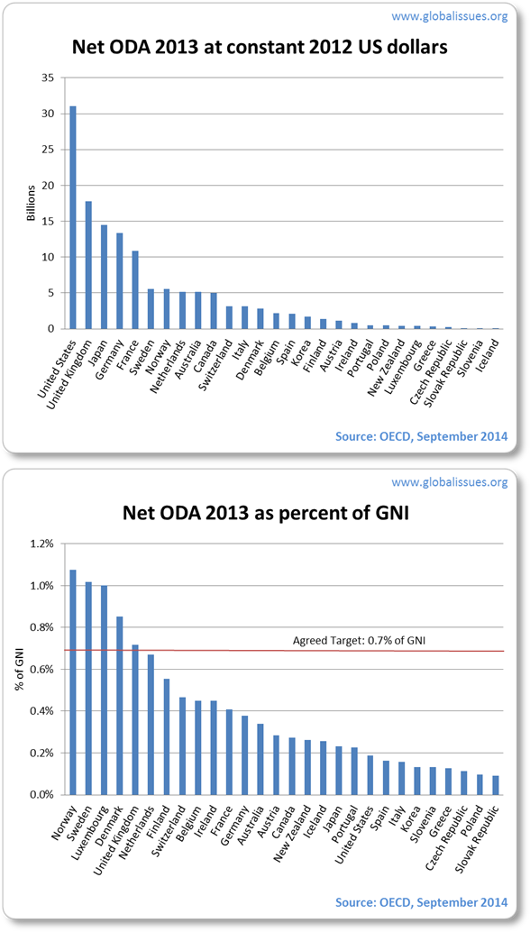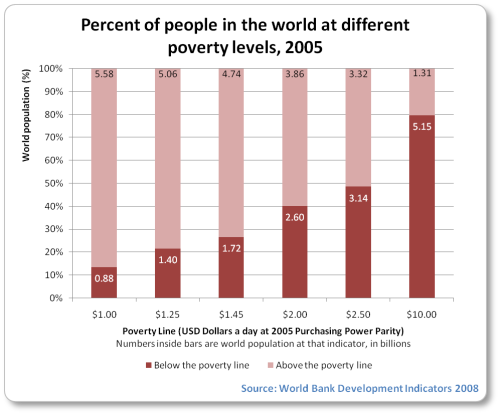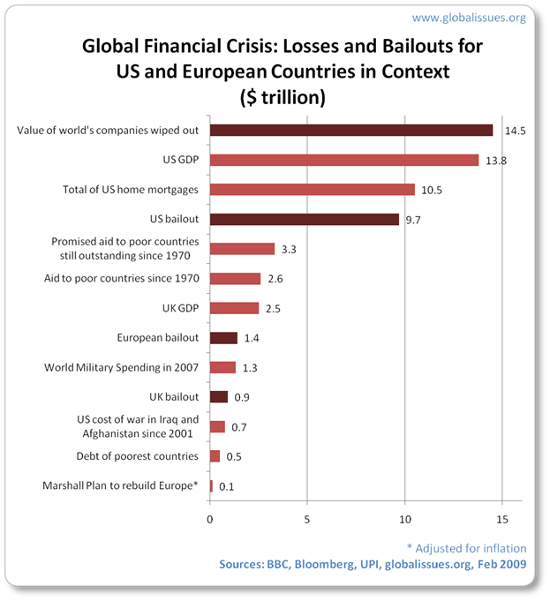Today, around 21,000 children died around the world. This daily tragedy, from poverty and other preventable causes, rarely makes headline news.
Latest world news
World
Russian attack on Kharkiv shopping centre ‘utterly unacceptable’, says senior UN official
- UN News
An attack by Russian armed forces on a busy shopping centre in Kharkiv on Saturday reportedly killed at least four people and injured around 40. Denise Brown, the UN Humanitarian coordinator in Ukraine, strongly condemned the strike and called for civilians to be protected.
International Court of Justice Orders Israel to Halt its Military Offensive in Rafah
- Inter Press Service

THE HAGUE, May 24 2024 (IPS) - The International Court of Justice (ICJ) ordered Israel to immediately halt its military offense in Rafah.
Slovakia PM Assassination Attempt Sparks Journalists’ Safety Fears
- Inter Press Service

BRATISLAVA, May 24 (IPS) - Fears for the safety of journalists in Slovakia are growing in the wake of an assassination attempt on the country’s prime minister, which some politicians are blaming in part on local independent media.
How Netanyahu Made the Creation of a Palestinian State Irreversible
- Inter Press Service

NEW YORK, May 24 (IPS) - It is ironic how Prime Minister Netanyahu, who vehemently opposed the establishment of a Palestinian state, made it all but irreversible because of his misguided policies and extreme ideological bent.
Nations agree landmark treaty on traditional knowledge, protecting Indigenous Peoples’ rights
- UN News

Member States of the World Intellectual Property Organization (WIPO) – a specialized UN agency – on Friday agreed to a groundbreaking new treaty addressing intellectual property (IP) in relation to genetic resources and associated traditional knowledge.
World News in Brief: UN aid chief on Rafah, Gaza fuel shortage, rising hunger in Haiti
- UN News

Global uproar calling for an end to the Israeli incursion in Rafah “has grown too loud to ignore”, UN Humanitarian Affairs Coordinator Martin Griffiths said on Friday, in a fresh appeal for a ceasefire in Gaza and the release of all hostages.
Security Council denounces attacks against aid workers, UN personnel
- UN News

The United Nations Security Council on Friday strongly condemned rising attacks on humanitarian workers and UN personnel, urging all conflict parties to ensure their safety and access.
Sudan: Deteriorating situation in El Fasher, health system collapsing nationwide
- UN News

The humanitarian situation for some 800,000 civilians in El Fasher, Sudan, and surrounding areas in North Darfur continues to deteriorate amid ongoing clashes between rival military forces, the UN reported on Friday.
Civilians in Ukraine describe continued Russian attacks in northeastern regions
- UN News

Civilians in the northeast of Ukraine are experiencing escalated hostilities as Russian armed forces have taken control of several villages, according to testimonies received by the UN Human Rights Monitoring Mission in Ukraine (HRMMU).
Myanmar: UN rights office warns of growing crisis in Rakhine state
- UN News

The UN High Commissioner for Human Rights on Friday called for an end to renewed violence in Myanmar’s Rakhine state, where reports have emerged of attacks against the minority Muslim Rohingya community, including beheadings and the razing of homes.
- More stories…
Climate
WMO warns of up to seven major hurricanes in North Atlantic in 2024
- UN News

The UN World Meteorological Organization (WMO) has issued a warning for an “above average” hurricane season in the North Atlantic in 2024. Based on data from the US National Oceanic and Atmospheric Administration (NOAA), this would mark the ninth consecutive year of anomalies.
Lessons From Youth-Focused ‘Future Action Festival’
- Inter Press Service

NAIROBI, May 23 (IPS) - The world has crossed the halfway point to the end of the Sustainable Development Goals (SDGs) era amid multiple, unprecedented, and significantly destructive global shocks. Two of the most pressing global challenges are the climate crisis and the threat of nuclear armament. Of serious concern is a severe lack of youth engagement on issues of critical global importance.
Democracy, Civic Space and Fundamental Freedoms Are under Attack, but Civil Society Is Here to Stay
- Inter Press Service

GABORONE, Botswana, May 23 (IPS) - Sarah Strack is Forus DirectorDuring the Forus network’s General Assembly which took place in Gaborone, Botswana, civil society organisations from across 65 countries highlighted the challenges facing them globally in an increasingly polarised and crisis-hit world.
‘All hands on deck’ in Antigua and Barbuda as small island States chart course to resilient prosperity
- UN News

Leaders from small island developing States worldwide will converge on the shores of Antigua and Barbuda in the Caribbean this weekend to deliver a bold new plan of action to build resilience on the road to the 2030 Sustainable Development Goals (SDGs).
Small Island Developing States can be Nature-Positive Leaders for the World
- Inter Press Service

UNITED NATIONS, May 22 (IPS) - Small island developing states (SIDS) are scattered across the globe, dotting the Pacific Ocean, the Caribbean, the west and east coasts of Africa and the Indian Ocean.
Droughts and floods threaten ‘humanitarian catastrophe’ across southern Africa
- UN News

Droughts and floods in southern Africa stemming from El Niño have left millions of people food insecure, warns World Food Programme (WFP) Executive Director Cindy McCain during a recent visit to Zambia – the epicentre of the crisis.
‘Be part of the plan’ to end nature loss on Biodiversity Day
- UN News

The diversity of animals, plants and microorganisms on the planet is at risk due to factors such as changing land use, urbanization, overexploitation, pollution and climate change, the UN said on Wednesday, calling for action now to protect a million species from extinction.
Panama’s Elections: Has Impunity Prevailed?
- Inter Press Service

MONTEVIDEO, Uruguay, May 21 (IPS) - Regional experts called it Panama’s most important election since the 1989 US invasion that deposed de facto president General Manuel Noriega. Panamanians went to the polls amid high inflation and unemployment, with a stagnating economy. Endemic corruption was also high on their long list of concerns, along with access to water, education and a collapsing social security system.
Accelerating extinction rate triggers domino effect of biodiversity loss
- UN News

While nearly one million species are currently at risk of extinction, the United Nations University (UNU) is drawing attention to “co-extinctions”: the chain reaction occurring when the complete disappearance of one species affects another.
INTERVIEW: Developing countries risk missing out on net-zero benefits, but fairer future is possible
- UN News

Inflation fears are subsiding, the “net-zero transition” to a clean economy could spell good news with the right policies in place, and we are still dealing with a “COVID hangover”, according to the UN Department for Economic and Social Affairs (DESA).
- More stories…
Health
COVID-19 eliminated a decade of progress in global level of life expectancy
- UN News

Data crunched by the UN World Health Organization (WHO) has revealed that the COVID-19 emergency reversed more than a decade of gains in life expectancyreinforcing the need for countries to agree on a global pandemic treaty to protect future generations.
WHO report reveals major health disparities between European teens
- UN News

A report published on Thursday from the World Health Organization’s (WHO) European region has revealed alarming health disparities in young people, especially those from less affluent families, representing a “vicious cycle of disadvantage”.
International Community Urged to End Impunity for Violence Against Healthcare in Conflicts
- Inter Press Service

BRATISLAVA, May 22 (IPS) - Governments and international agencies must do more to end impunity for violence against healthcare, campaigners have urged, as a new report shows that attacks on healthcare during conflicts reached a new high last year.
Stories from the UN Archive: Magic suitcases for 1960s midwives
- UN News

Can a magic suitcase save lives?
‘Critical gaps’ in understanding climate change fuel tropical disease spread
- UN News

A comprehensive review by the UN health agency has revealed critical gaps in understanding the full impact of climate change on malaria, dengue, trachoma and other tropical diseases.
WHO reports major increase in sexually transmitted infections
- UN News

Sexually transmitted infections (STIs) such as syphilis are on the rise in most regions of the world, UN health agency WHO said in a new report on Tuesday.
Syria: WHO Regional Director calls for greater investment in health sector
- UN News

Failure to invest in the health of the Syrian people will only deepen instability in the war-ravaged country and pose threats to regional and global security, a senior official with the World Health Organization (WHO) has said.
Rising Temperatures Drive Human-Wildlife Conflict in Zimbabwe
- Inter Press Service

BULAWAYO, Zimbabwe, May 17 (IPS) - Rising temperatures are being blamed for an increase in human-wildlife conflicts in Zimbabwe as animals such as snakes leave their natural habitat earlier than usual.
Afghan Women Struggle with Soaring Mental Health Issues
- Inter Press Service

May 16 (IPS) - Afghanistan is grappling with a growing crisis of mental illness, particularly among its women, as highlighted in a United Nations report. Officials from the mental health department at Herat regional hospital have observed a concerning uptick in the number of women afflicted by psychological disorders in the province.
SBSTTA and SBIBiodiversity Meetings Crucial for the Global South Begin
- Inter Press Service

NAIROBI, May 14 (IPS) - The 26th meeting of the Subsidiary Body of Scientific, Technical, and Technological Advisors (SBSTTA) of the United Nations Convention on Biological Diversity (UNCBD) started in Nairobi, Kenya, on Monday. Over 1,400 delegates, including 600 representing signatories or parties from over 150 countries, are present for the seven-day meeting at the headquarters of the United Nations Environment Programme (UNEP). A large number of members from Indigenous Peoples and other observer organizations, including women’s groups, are also attending the meetings.
- More stories…
Economy
North Macedonia Turns Back the Clock
- Inter Press Service

LONDON, May 23 (IPS) - The old guard is back in North Macedonia, as the former ruling party – the Internal Macedonian Revolutionary Organization – Democratic Party for Macedonian National Unity (VMRO-DPMNE) – returns to parliamentary and presidential power.
‘All hands on deck’ in Antigua and Barbuda as small island States chart course to resilient prosperity
- UN News

Leaders from small island developing States worldwide will converge on the shores of Antigua and Barbuda in the Caribbean this weekend to deliver a bold new plan of action to build resilience on the road to the 2030 Sustainable Development Goals (SDGs).
Small Island Developing States can be Nature-Positive Leaders for the World
- Inter Press Service

UNITED NATIONS, May 22 (IPS) - Small island developing states (SIDS) are scattered across the globe, dotting the Pacific Ocean, the Caribbean, the west and east coasts of Africa and the Indian Ocean.
Panama’s Elections: Has Impunity Prevailed?
- Inter Press Service

MONTEVIDEO, Uruguay, May 21 (IPS) - Regional experts called it Panama’s most important election since the 1989 US invasion that deposed de facto president General Manuel Noriega. Panamanians went to the polls amid high inflation and unemployment, with a stagnating economy. Endemic corruption was also high on their long list of concerns, along with access to water, education and a collapsing social security system.
INTERVIEW: Developing countries risk missing out on net-zero benefits, but fairer future is possible
- UN News

Inflation fears are subsiding, the “net-zero transition” to a clean economy could spell good news with the right policies in place, and we are still dealing with a “COVID hangover”, according to the UN Department for Economic and Social Affairs (DESA).
More Diversified Trade Can Make Middle East & Central Asia More Resilient
- Inter Press Service

WASHINGTON DC, May 17 (IPS) - Dislocations from the pandemic, geoeconomic fragmentation, and Russia’s war in Ukraine have shifted world trade dynamics. While this has created challenges, the redirection of trade has also generated new opportunities, particularly for the Caucasus and Central Asia.
Solomon Islands: A Change More in Style than Substance
- Inter Press Service

LONDON, May 16 (IPS) - There’s change at the top in Solomon Islands – but civil society will be watching closely to see whether that means a government that’s grown hostile will start doing things differently.
Jeremiah Manele is the new prime minister, emerging from negotiations that followed April’s general election. He’s part of OUR Party, led by outgoing four-time prime minister Manasseh Sogavare. The party came first, winning 15 of 50 constituencies, but several incumbents who stood for it lost their parliamentary seats, and Sogavare only narrowly held his. Weakened, Sogavare stood aside to allow Manele to prevail as the consensus candidate of the post-election coalition his party stitched together.
UN forum in Bahrain closes with calls to support women entrepreneurs in conflict areas
- UN News

The bi-annual UN forum on entrepreneurship and innovation wrapped up its work in Bahrain on Thursday focusing on women entrepreneurs from conflict zones, who stressed the importance of investing in their activities as a means of building peace, security, and stability in their communities.
Global economic growth improves but ‘downsides’ lurk
- UN News

The global economic picture has improved since January, but vulnerabilities remain, the mid-year update of the World Economic Situation and Prospects report published on Thursday has revealed.
Chronicle of a Catastrophe Foretold
- Inter Press Service

KUALA LUMPUR, Malaysia, May 15 (IPS) - The IMF warns of a decade ahead of ‘tepid growth’ and ‘popular discontent’, with the poorest economies worst off. But as with inaction on Gaza, little is being done multilaterally to avert the imminent catastrophe.
- More stories…
More news topics
Read more news stories by
More news by World, Economy, Environment, Geopolitics, Health, Human Rights, More news topics …
World news powered by and
and 
Issues in depth
Latest
Action on climate change is cheaper than inaction
Many are afraid that tackling climate change is going to be too costly. But increasingly, studies are showing action will not just be cheaper than inaction, but could actually result in economic, environmental and even health benefits, while improving sustainability.
Read “Action on climate change is cheaper than inaction” to learn more.
Climate Change and Global Warming Introduction
 The climate is changing. The earth is warming up, and there is now overwhelming scientific consensus that it is happening, and human-induced. With global warming on the increase and species and their habitats on the decrease, chances for ecosystems to adapt naturally are diminishing.
The climate is changing. The earth is warming up, and there is now overwhelming scientific consensus that it is happening, and human-induced. With global warming on the increase and species and their habitats on the decrease, chances for ecosystems to adapt naturally are diminishing.
Many are agreed that climate change may be one of the greatest threats facing the planet. Recent years show increasing temperatures in various regions, and/or increasing extremities in weather patterns.
This section looks at what causes climate change, what the impacts are and where scientific consensus currently is.
Read “Climate Change and Global Warming Introduction” to learn more.
COP20—Lima Climate Conference
 An overview of the Climate Change Conference (also known as COP 20), held in Lima, Peru in December 2014.
An overview of the Climate Change Conference (also known as COP 20), held in Lima, Peru in December 2014.
While it seemed like it was a successful meeting, because developing nations were committed to drawing up their own plans for emissions reductions for the first time, a number of important issues were left undecided such as how financing would work.
This page is an overview of the Lima Climate conference.
Read “COP20—Lima Climate Conference” to learn more.
Ebola Outbreak in West Africa
An overview of the Ebola virus outbreak in West Africa that has been described by the World Health Organization as the largest, most severe and most complex outbreak in the history of the disease.
The epidemic began at the end of 2013, in Guinea. From there it spread to Liberia, Sierra Leone, Nigeria and Senegal. Many of the affected countries face enormous challenges in stopping its spread and providing care for all patients.
Thousands of people have died and many are at risk as the fatality rate from this virus is very high. As the crisis worsens, as well as the enormous health challenges involved, the social and economic consequences may set these countries back, reversing some gains a number of these countries have made in recent years.
Read “Ebola Outbreak in West Africa” to learn more.
Foreign Aid for Development Assistance
In 1970, the world’s rich countries agreed to give 0.7% of their gross national income as official international development aid, annually.
Since that time, billions have certainly been given each year, but rarely have the rich nations actually met their promised target.
For example, the US is often the largest donor in dollar terms, but ranks amongst the lowest in terms of meeting the stated 0.7% target.
Furthermore, aid has often come with a price of its own for the developing nations. Common criticisms, for many years, of foreign aid, have included the following:
- Aid is often wasted on conditions that the recipient must use overpriced goods and services from donor countries
- Most aid does not actually go to the poorest who would need it the most
- Aid amounts are dwarfed by rich country protectionism that denies market access for poor country products while rich nations use aid as a lever to open poor country markets to their products
- Large projects or massive grand strategies often fail to help the vulnerable; money can often be embezzled away.
This article explores who has benefited most from this aid, the recipients or the donors.
Read “Foreign Aid for Development Assistance” to learn more.
Nature and Animal Conservation
 Preserving species and their habitats is important for ecosystems to self-sustain themselves.
Preserving species and their habitats is important for ecosystems to self-sustain themselves.
Yet, the pressures to destroy habitat for logging, illegal hunting, and other challenges are making conservation a struggle.
Read “Nature and Animal Conservation” to learn more.
Most Popular
Poverty Facts and Stats
Most of humanity lives on just a few dollars a day. Whether you live in the wealthiest nations in the world or the poorest, you will see high levels of inequality.
The poorest people will also have less access to health, education and other services. Problems of hunger, malnutrition and disease afflict the poorest in society. The poorest are also typically marginalized from society and have little representation or voice in public and political debates, making it even harder to escape poverty.
By contrast, the wealthier you are, the more likely you are to benefit from economic or political policies. The amount the world spends on military, financial bailouts and other areas that benefit the wealthy, compared to the amount spent to address the daily crisis of poverty and related problems are often staggering.
Some facts and figures on poverty presented in this page are eye-openers, to say the least.
Read “Poverty Facts and Stats” to learn more.
Global Financial Crisis
 Following a period of economic boom, a financial bubble — global in scope — burst, even causing some of the world’s largest financial institutions have collapsed. With the resulting recession, many governments of the wealthiest nations in the world have resorted to extensive bail-out and rescue packages for the remaining large banks and financial institutions while imposing harsh austerity measures on themselves.
Following a period of economic boom, a financial bubble — global in scope — burst, even causing some of the world’s largest financial institutions have collapsed. With the resulting recession, many governments of the wealthiest nations in the world have resorted to extensive bail-out and rescue packages for the remaining large banks and financial institutions while imposing harsh austerity measures on themselves.
Some of the bail-outs have also led to charges of hypocrisy due to the apparent socializing of the costs while privatizing the profits.
Furthermore, the institutions being rescued are typically the ones got the world into this trouble in the first place. For smaller businesses and poorer people, such options for bail out and rescue are rarely available when they find themselves in crisis.
Plummeting stock markets at one point wiped out 33% of the value of companies, $14.5 trillion. Taxpayers bailed out their banks and financial institutions with large amounts of money. US taxpayers alone have spent some $9.7 trillion in bailout packages and plans. The UK and other European countries have also spent some $2 trillion on rescues and bailout packages. More is expected. Much more.
Such numbers, made quickly available, are enough to wipe many individual’s mortgages, or clear out third world debt many times over. Even the high military spending figures are dwarfed by the bailout plans to date.
This problem could have been averted (in theory) as people had been pointing to these issues for decades. However, during boom, very few want to hear such pessimism. Does this crisis spell an end to the careless forms of banking and finance and will it herald a better economic age, or are we just doomed to keep forgetting history and repeat these mistakes in the future? Signs are not encouraging as rich nations are resisting meaningful reform…
Read “Global Financial Crisis” to learn more.
Causes of Poverty
Poverty is the state for the majority of the world’s people and nations. Why is this? Is it enough to blame poor people for their own predicament? Have they been lazy, made poor decisions, and been solely responsible for their plight? What about their governments? Have they pursued policies that actually harm successful development? Such causes of poverty and inequality are no doubt real. But deeper and more global causes of poverty are often less discussed.
Read “Causes of Poverty” to learn more.
Climate Change and Global Warming
 The climate is changing. The earth is warming up, and there is now overwhelming scientific consensus that it is happening, and human-induced. With global warming on the increase and species and their habitats on the decrease, chances for ecosystems to adapt naturally are diminishing. Many are agreed that climate change may be one of the greatest threats facing the planet. Recent years show increasing temperatures in various regions, and/or increasing extremities in weather patterns.
The climate is changing. The earth is warming up, and there is now overwhelming scientific consensus that it is happening, and human-induced. With global warming on the increase and species and their habitats on the decrease, chances for ecosystems to adapt naturally are diminishing. Many are agreed that climate change may be one of the greatest threats facing the planet. Recent years show increasing temperatures in various regions, and/or increasing extremities in weather patterns.
This section explores some of the effects of climate change. It also attempts to provide insights into what governments, companies, international institutions, and other organizations are attempting to do about this issue, as well as the challenges they face. Some of the major conferences in recent years are also discussed.
Read “Climate Change and Global Warming” to learn more.
Environmental Issues
 Environmental issues are also a major global issue. Humans depend on a sustainable and healthy environment, and yet we have damaged the environment in numerous ways. This section introduces other issues including biodiversity, climate change, animal and nature conservation, population, genetically modified food, sustainable development, and more.
Environmental issues are also a major global issue. Humans depend on a sustainable and healthy environment, and yet we have damaged the environment in numerous ways. This section introduces other issues including biodiversity, climate change, animal and nature conservation, population, genetically modified food, sustainable development, and more.
Read “Environmental Issues” to learn more.
Racism
 Racism is the belief that characteristics and abilities can be attributed to people simply on the basis of their race and that some racial groups are superior to others. Racism and discrimination have been used as powerful weapons encouraging fear or hatred of others in times of conflict and war, and even during economic downturns. This article explores racism from around the world.
Racism is the belief that characteristics and abilities can be attributed to people simply on the basis of their race and that some racial groups are superior to others. Racism and discrimination have been used as powerful weapons encouraging fear or hatred of others in times of conflict and war, and even during economic downturns. This article explores racism from around the world.
Read “Racism” to learn more.
Topical
Global Financial Crisis
 Following a period of economic boom, a financial bubble — global in scope — burst, even causing some of the world’s largest financial institutions have collapsed. With the resulting recession, many governments of the wealthiest nations in the world have resorted to extensive bail-out and rescue packages for the remaining large banks and financial institutions while imposing harsh austerity measures on themselves.
Following a period of economic boom, a financial bubble — global in scope — burst, even causing some of the world’s largest financial institutions have collapsed. With the resulting recession, many governments of the wealthiest nations in the world have resorted to extensive bail-out and rescue packages for the remaining large banks and financial institutions while imposing harsh austerity measures on themselves.
Some of the bail-outs have also led to charges of hypocrisy due to the apparent socializing of the costs while privatizing the profits.
Furthermore, the institutions being rescued are typically the ones got the world into this trouble in the first place. For smaller businesses and poorer people, such options for bail out and rescue are rarely available when they find themselves in crisis.
Plummeting stock markets at one point wiped out 33% of the value of companies, $14.5 trillion. Taxpayers bailed out their banks and financial institutions with large amounts of money. US taxpayers alone have spent some $9.7 trillion in bailout packages and plans. The UK and other European countries have also spent some $2 trillion on rescues and bailout packages. More is expected. Much more.
Such numbers, made quickly available, are enough to wipe many individual’s mortgages, or clear out third world debt many times over. Even the high military spending figures are dwarfed by the bailout plans to date.
This problem could have been averted (in theory) as people had been pointing to these issues for decades. However, during boom, very few want to hear such pessimism. Does this crisis spell an end to the careless forms of banking and finance and will it herald a better economic age, or are we just doomed to keep forgetting history and repeat these mistakes in the future? Signs are not encouraging as rich nations are resisting meaningful reform…
Read “Global Financial Crisis” to learn more.
Climate Change and Global Warming
 The climate is changing. The earth is warming up, and there is now overwhelming scientific consensus that it is happening, and human-induced. With global warming on the increase and species and their habitats on the decrease, chances for ecosystems to adapt naturally are diminishing. Many are agreed that climate change may be one of the greatest threats facing the planet. Recent years show increasing temperatures in various regions, and/or increasing extremities in weather patterns.
The climate is changing. The earth is warming up, and there is now overwhelming scientific consensus that it is happening, and human-induced. With global warming on the increase and species and their habitats on the decrease, chances for ecosystems to adapt naturally are diminishing. Many are agreed that climate change may be one of the greatest threats facing the planet. Recent years show increasing temperatures in various regions, and/or increasing extremities in weather patterns.
This section explores some of the effects of climate change. It also attempts to provide insights into what governments, companies, international institutions, and other organizations are attempting to do about this issue, as well as the challenges they face. Some of the major conferences in recent years are also discussed.
Read “Climate Change and Global Warming” to learn more.
Food and Agriculture Issues
 Food and agriculture goes to the heart of our civilizations. Religions, cultures and even modern civilization have food and agriculture at their core. For an issue that goes to the heart of humanity it also has its ugly side.
Food and agriculture goes to the heart of our civilizations. Religions, cultures and even modern civilization have food and agriculture at their core. For an issue that goes to the heart of humanity it also has its ugly side.
This issue explores topics ranging from the global food crisis of 2008, to issues of food aid, world hunger, food dumping and wasteful agriculture such as growing tobacco, sugar, beef, and more.
Read “Food and Agriculture Issues” to learn more.
Foreign Aid for Development Assistance
In 1970, the world’s rich countries agreed to give 0.7% of their gross national income as official international development aid, annually.
Since that time, billions have certainly been given each year, but rarely have the rich nations actually met their promised target.
For example, the US is often the largest donor in dollar terms, but ranks amongst the lowest in terms of meeting the stated 0.7% target.
Furthermore, aid has often come with a price of its own for the developing nations. Common criticisms, for many years, of foreign aid, have included the following:
- Aid is often wasted on conditions that the recipient must use overpriced goods and services from donor countries
- Most aid does not actually go to the poorest who would need it the most
- Aid amounts are dwarfed by rich country protectionism that denies market access for poor country products while rich nations use aid as a lever to open poor country markets to their products
- Large projects or massive grand strategies often fail to help the vulnerable; money can often be embezzled away.
This article explores who has benefited most from this aid, the recipients or the donors.
Read “Foreign Aid for Development Assistance” to learn more.
Tax Avoidance and Tax Havens; Undermining Democracy
 Through tax havens, transfer pricing and many other policies — both legal and illegal — billions of dollars of tax are avoided. The much-needed money would helped developing (and developed) countries provide important social services for their populations.
Through tax havens, transfer pricing and many other policies — both legal and illegal — billions of dollars of tax are avoided. The much-needed money would helped developing (and developed) countries provide important social services for their populations.
Some tax avoidance, regardless of how morally objectionable it may be to some people, is perfectly legal, and the global super elite are able to hide away trillions of dollars, resulting in massive losses of tax revenues for cash-strapped governments who then burden ordinary citizens further with austerity measures during economic crisis, for example. Yet these super elite are often very influential in politics and business. In effect, they are able to undermine democracy and capitalism at the same time.
As the global financial crisis has affected many countries, tackling tax avoidance would help target those more likely to have contributed to the problem while avoid many unnecessary austerity measures that hit the poorest so hard. But despite rhetoric stating otherwise, it does not seem to high on the agenda of many governments as you might think.
Read “Tax Avoidance and Tax Havens; Undermining Democracy” to learn more.
World Military Spending
World military spending had reduced since the Cold War ended, but a few nations such as the US retain high level spending.
In recent years, global military expenditure has increased again and is now comparable to Cold War levels. Recent data shows global spending at over $1.7 trillion. 2012 saw the first dip in spending — only slightly —since 1998, in an otherwise rising trend.
The highest military spender is the US accounting for almost two-fifths of the world’s spending, more than the rest of the G7 (most economically advanced countries) combined, and more than all its potential enemies, combined.
Read “World Military Spending” to learn more.
“If a man is offered a fact which goes against his instincts, he will scrutinize it closely, and unless the evidence is overwhelming, he will refuse to believe it. If, on the other hand, he is offered something which affords a reason for acting in accordance to his instincts, he will accept it even on the slightest evidence.” — Bertrand Russell, Roads to Freedom
 Global Issues
Global Issues


